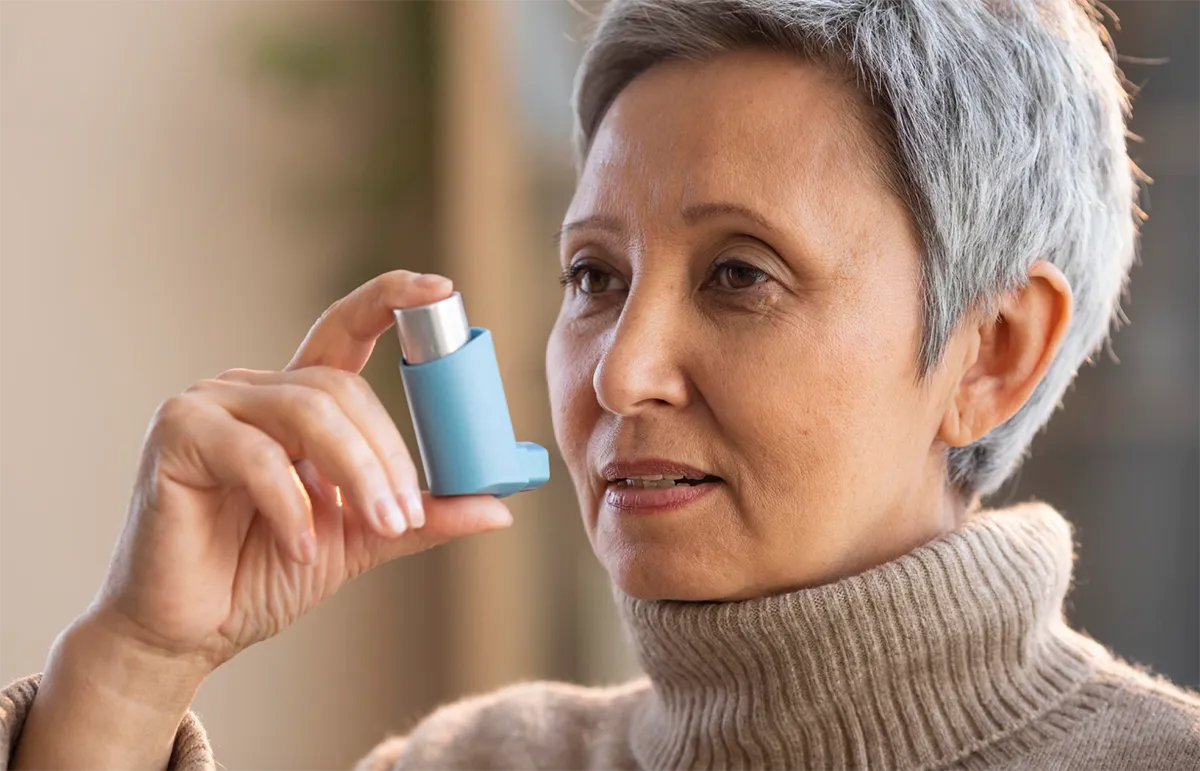Learn More About Asthma Clinical Trials
What Are Asthma Clinical Trials?
Asthma, also known as bronchial asthma, is a lung disease that causes the airways to get swollen and narrow. This makes it difficult for patients to breathe and often results in coughing, whistling, and shortness of breath. Asthma is a chronic condition with no cure and requires ongoing medication.
For some patients, asthma is a minor problem that doesn’t disrupt their quality of life. For others, asthma can interfere with their quality of life and maybe life threatening if they don’t get medical attention. Asthma often leads to an excessive production of mucus that can clog the airways. It may cause inflammation of the inner lining of the airways, which restricts air movement. Finally, asthma can also cause bronchospasm, a condition where the muscles around the airways tighten.
This makes it difficult to breathe and could be life-threatening without medication. An estimated 25 million patients in the US have asthma, including 5 million children. Since there is no permanent cure for asthma, researchers are looking for ways to effectively manage the condition and improve the patient’s quality of life. More asthma research studies are vital for understanding the condition, its treatment, and how it’s triggered.

Why Is Asthma Being Studied Through Clinical Trials?
Asthma is highly prevalent throughout the world and affects millions of people. If left untreated, asthma can be life-threatening. Despite its prevalence, researchers have been unable to pinpoint the exact causes of asthma. This requires more asthma research studies to understand its underlying mechanisms and find novel treatment methods.
Researchers have been able to find a correlation between certain factors and the chances of developing asthma. A major risk factor for developing asthma is exposure to allergens. Patients may also develop asthma after being exposed to pollutants that enter their airways and irritate them. These substances may include, besides allergens, fumes, toxins, and other particulate matter.
Particulate matter can be particularly harmful to young children and infants, who are still developing their immune systems. Furthermore, researchers have identified that individuals with a history of asthma may be more likely to develop the disease. Occasionally, respiratory infections could damage the lungs and lead to arthritis. This is especially common in children.
Despite the ongoing research on asthma and the body of literature on the condition, it is one of the most misunderstood diseases. More research is needed to help doctors develop effective diagnostic tools and treatment plans. Other topics being investigated include the role of the immune system in developing asthma and learning about the subtypes of asthma. These studies will improve the patient's quality of life and therapy.
What Are The Types of Treatments Available For Asthma?
Although there is no permanent cure for asthma, patients have several options to help them manage the symptoms. Their healthcare provider will first evaluate their symptoms to prescribe appropriate medications to manage symptoms. Doctors may perform a physical exam and listen to the patient’s breathing using a stethoscope.
They may also perform various breathing tests, including pulmonary function tests (PFTs) and spirometry, to help with diagnosis. Bronchodilators are a medication that relax the muscles in the lungs and widen the airways to make breathing easier. They also allow smooth passage to mucus to flow easily through the airway. Bronchodilators may also be prescribed to help with exercise performance.

Asthma often causes inflammation of the inner lining of the airways. Certain types of anti-inflammatory drugs are effective at managing this inflammation. The most effective product is inhaled corticosteroids because they reduce mucus production and airway swelling. Using inhaled corticosteroids includes improved lung function, fewer asthma flare-ups, and better asthma management.
Researchers have also developed novel biologic treatments for treating asthma. These treatments are used when patients have severe symptoms of asthma that cannot be treated with inhaled corticosteroids. Some of the most popular biologic treatments for asthma include mepolizumab, omalizumab, and benralizumab.
What Are Some Recent Breakthrough Clinical Trials For Asthma?
Asthma clinical trials will play an important role in helping researchers and doctors understand the condition, its causes, and different treatment methods. Here is a look at recent clinical trials for asthma.
2017: Effects of Exercise and Diet in Patients with Asthma - This randomized clinical trial investigated the impact of exercise and a healthy diet in non-obese patients with asthma. 149 adults with asthma were randomized to four groups: a diet group, a control group, an exercise and diet group, and an exercise group.
The outcomes of the study were measured using the Asthma Control Questionnaire (ACQ) and quality of life questionnaires, among others. It was found that combining diet and exercise significantly improved asthma control in patients but did not affect airway inflammation or airway hyperresponsiveness (AHR).
2017: Preventing Asthma Exacerbations in Children - This randomized trial investigated the use of dust mite impermeable bedding and its impact on children with severe asthma. Researchers randomized 434 mite sensitized children with asthma to receive mite impermeable encasings and placebo bed encasings over the course of 12 months. At the end of the 12-month mark, significantly fewer participants in the active group went to the hospital with an exacerbation compared to the placebo group.
The mite impermeable bed encasing reduced the risk of emergency hospital attendance by 45% compared to the placebo group. Moreover, the annual emergency hospital attendance with exacerbation rate was 27% lower in the active group. The study shows that mite impermeable encasings can play an essential role in reducing asthma exacerbations and preventing frequent trips to the hospital.
2018: Results of Asthma Education Via Telemedicine in Rural Schools - It is a well-known fact asthma morbidity is high in children from rural areas of the US. However, few interventions have been designed to help with asthma in children from rural areas. This randomized controlled trial examined the effect of a school-based asthma education program delivered to children via telemedicine.
393 children were enrolled in the study, of which 47% lived in households with an annual income of less than $15000. The study found minor improvements of behavioral change in the intervention group. However, it recommends similar trials in the future that were designed with a more multifaceted approach.
2019: Behavioral Intervention Could Decrease Asthma Exacerbation - This randomized clinical trial evaluated the impact of a self-management asthma intervention in older adults. 189 participants (55y or older) were in a controlled trial of a six-session asthma self-management interaction. Researchers monitored various outcomes, including asthma control, FeNO, spirometry values, hospitalizations, and emergency department visits.
It was found that the intervention group was less likely to have an asthma exacerbation and had better asthma self-management score. The researchers concluded that self-management intervention plans are recommended for successfully decreasing asthma exacerbation in older adults.
2019: Impact of Relaxation Training in QOL of Asthma Patients - 30 patients from Tehran were randomized into two groups: to assess the effectiveness of relaxation techniques. Researchers used the Papworth method of relaxation on patients. The technique’s efficacy was measured using the STAI and SF-36 questionnaire for QoL. It was found that the Papworth method was effective at controlling stressful conditions in patients with asthma.
2021: Pulmonary Innate Lymphoid Cell Responses during Rhinovirus-induced Asthma Exacerbations - The objective of this study was to monitor pulmonary type 2 innate lymphoid cell responses after experimental rhinovirus infection in participants with moderate asthma and healthy subjects. The ratio of ICL2 to ICL1 was measured to determine their contribution to the immune response to the rhinovirus infection.
It was found that ICL2s were higher in patients struggling with asthma compared to healthy participants. By day 8, ICL2 was much higher in both groups. ICL1 increased from baseline on Day 3, while ICL1 increased from baseline on Day 8. It was determined that patients with asthma had ICL2-predominant inflammatory profiles and experienced a longer duration of rhinovirus infection with increased severity compared to healthy participants.
2022: Using Tezepelumab in Patients with Severe Asthma - Tezepelumab is a human monoclonal antibody that blocks the activity of TSLP. Previous studies have shown that it reduces asthma exacerbation (AAERs) compared to a placebo. In this randomized controlled trial, researchers investigated if Tezepelumab could improve the quality of life in patients with severe asthma.
550 patients with severe asthma were randomized into groups that were given 210 mg or 70 mg of Tezepelumab every four weeks or 280 mg every two weeks or a placebo. The total duration of the study was 52 weeks. Various measurements were taken, including fractional exchanged nitric oxide, total serum immunoglobulin, and interleukin 5, among others. Tezepelumab reduced several T2 inflammatory biomarkers, reducing exacerbations and decreasing airway inflammation in patients with severe asthma.
Who Are Some Of The Key Opinion Leaders / Researchers / Institutions Conducting Depression Clinical Trial Research?
Professor Aziz Sheikh MD is one of the leading researchers in asthma and a director of the Usher Institute. He is a dean of Data for the University of Edinburgh and Director of the Asthma UK Center Applied Research. He is involved with the UK Asthma Observatory, which plays a crucial role in Asthma research.
Professor Sebastian Johnston is a professor of Respiratory Medicine at the National Heart and Lung Institute Imperial College London. He is the Director of the MRC & Asthma UK Center in Allergic Mechanisms of Asthma. Johnston is an NIHR Senior Investigator who has worked on several clinical trials to further the research in asthma studies. His contributions have led to 10 patents that are improving the treatment of acute exacerbations of asthma.
Ohio State Asthma Center is dedicated to ensuring that patients with asthma have a better quality of life. The experts at the center only prescribe as much medicine as patients need to manage their asthma effectively. Their primary goal is to conduct high-quality research to improve asthma patients' lives. The center has participated in several research studies to develop novel diagnostic tools and treatment plans. Jonathan Parsons is the director at OSU, whose research interest is focused on athletes with asthma.